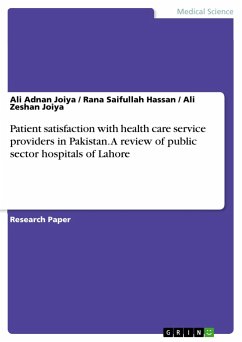
Government Sector Health Care Set-up Woes in Hyderabad, Pakistan
Versandkostenfrei!
Versandfertig in 6-10 Tagen
27,99 €
inkl. MwSt.

PAYBACK Punkte
14 °P sammeln!
This book stems from a series of surveillance reports on the physical and psychological well being of the patients, their attendants and health professionals that are tagged in the government sector. Patients' perceptions about government sector health services and the effects it casts in psycho-social, financial, health/recovery scenario seem to have been largely ignored by health care providers in developing countries. Those who can afford no other alternative seek help of this sector our country since the treatment efficacy is low and substandard health is achieved, while preventive care or...
This book stems from a series of surveillance reports on the physical and psychological well being of the patients, their attendants and health professionals that are tagged in the government sector. Patients' perceptions about government sector health services and the effects it casts in psycho-social, financial, health/recovery scenario seem to have been largely ignored by health care providers in developing countries. Those who can afford no other alternative seek help of this sector our country since the treatment efficacy is low and substandard health is achieved, while preventive care or early detection simply falls by the wayside. Patients' voice must begin to play a greater role in the design of health care service delivery processes in the developing countries. This book is, therefore, government sector-centered and identifies the service quality factors that are important to ensure better outcomes; it also examines their links to patient, their attendants and health professional woes in the context of public sector health setup in Hyderabad, a city in Pakistan that plays host to patients and health professionals from diverse socio-demographic backgrounds.












